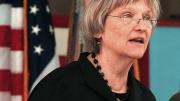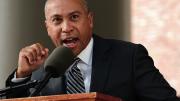The ROTC Commissioning Ceremony, conducted Wednesday morning, focuses attention on a small number of graduating students (four members of the class of 2015) who have made an extraordinary commitment to service. This year, it was also an occasion for special reflection by President Drew Faust, who is an historian of the American South and the Civil War. A part of her talk follows, as does an excerpt from an essay published in the Crimson’s Commencement issue—a professor’s alternative to the usual graduation boilerplate.
“Who else if not we?”
At the end of Commencement week exactly 150 years ago, a crowd assembled here in the Yard for a very special Harvard occasion—a commemoration of the end of four long years of Civil War. The day was to be a celebration of the sons of Harvard who had served and a solemn memorial to those who had died.
The program…lasted from early in the morning to well into the evening.…Massachusetts Hall, Harvard Hall, and University Hall were festooned with red, white, and blue bunting and flags, a golden eagle, and seals of the Commonwealth and the nation. A…parade of dignitaries and more than 250 student veterans marched across the Yard. Many who were still on active duty had been released for the day by special dispensation from General Grant and Secretary of War Stanton.…Ralph Waldo Emerson spoke, as did Dr. Oliver Wendell Holmes, whose son, later to become Justice Holmes, had been severely wounded in battle. The poet James Russell Lowell read a lengthy poem composed for the occasion, and Julia Ward Howe, the author of “The Battle Hymn of the Republic,” also wrote a poem, but it was read by someone else, since it would have been unseemly for a lady to address a public gathering.…
One speaker…mused on the connections between students and scholars, and the arts and practices of war. He observed that scholars are naturally “lovers of peace.” But he noted that between 1861 and 1865, and I quote him again, “The members of the higher seminaries of learning throughout the land have been among the foremost to respond to the call of duty and patriotism. They have asked no exemption…pleaded no ineptitude for the hardships…of the soldiers’ lot.” He continued: “Who else if not they? If the children of light [and learning] falter, who shall stand? If they hold back, who shall go forth?”
Now, these questions are posed in the stylized and florid language of another time. We are 150 years away from the day those words rang out in this very place. But their essential truth remains: “Who else if not they?” Who else if not we?
Separately, at the Phi Beta Kappa literary exercises Tuesday morning, the Collegium Musicum sang a musical setting, composed by Evan O’Dorney ’15, of a poem written by Oliver Wendell Holmes for the laying of the Memorial Hall cornerstone, on October 6, 1870.
Remembering College
[W]hile inspirational advice is a much-anticipated and possibly necessary part of the ritual of Commencement, it is also very possible that you will not remember very much of it in later years—or that you will remember some of it, but not for the reasons that the speaker intended. If this is true, then what does endure?…Speaking largely from my own undergraduate experience, here [is one possibility]:
Your experiences of intellectual expansion: In the fall of my freshman year, one of my senior and urbane professors happened to finish up his lecture a few minutes early, and said that he would be happy to take a few questions. I was sitting way in the back of the lecture hall, where I thought I would be safely invisible. Nevertheless, I worked up the courage to raise my hand, expose my ignorance, and ask a question. Before he answered, he said something that meant the world to me. He said, “What a good question!” And these words subtly but powerfully changed me forever. It was my first inkling that college might not just be about stuff you were supposed to know or learn, but also about unknown stuff that you could find out about.
From “What You Might Remember,” The Harvard Crimson, by Anne Harrington ’82, Ford professor of the history of science and master of Pforzheimer House
* * *
Americans, including some on campus, are infatuated with innovation, perhaps overly so, and very much at odds—even infuriated—with organizations, in commerce, governance, and higher education. In her afternoon address, President Drew Faust pushed back against the fashion for self-absorption and, as she has since her installation address nearly eight years ago, made the case for institutions—including, importantly, the one she leads. Excerpts follow.
“We are larger than ourselves and our selfies”
Self-absorption may obscure not only our responsibilities to others but our dependence upon them. And this is troubling for Harvard, for higher education and for fundamental social institutions whose purposes and necessity we forget at our peril.
Why do we even need college, critics demand? Can’t we do it all on our own? Peter Thiel…has urged students to drop out and has even subsidized them—including several of our undergraduates—to leave college and pursue their individual entrepreneurial dreams. After all, the logic goes, Mark Zuckerberg and Bill Gates dropped out and they seem to have done OK. Well, yes. But we should remember: Bill Gates and Mark Zuckerberg had Harvard to drop out of. Harvard to serve as the place where their world-changing discoveries were born. Harvard and institutions like it to train the physicists, mathematicians, computer scientists, business analysts, lawyers, and thousands of other skilled individuals upon whom Facebook and Microsoft depend. Harvard to enlighten public servants to lead a country in which Facebook, Microsoft, and companies like them can thrive. Harvard to nurture the writers and filmmakers and journalists who create the storied “content” that gives the Internet its substance. And we must recognize as well that universities have served as sources of discoveries essential to the work of the companies advancing the revolutions in technology that have changed our lives.…
Assertions about the irrelevance of universities are part of a broader and growing mistrust of institutions more generally, one fueled by our intoxication with the power and charisma of the individual and the cult of celebrity.…
There are few countervailing voices to remind us how institutions serve and support us. We tend to take what they do for granted. Your food was safe; your blood test was reliable; your polling place was open; electricity was available when you flipped the switch. Your flight to Boston took off and landed according to rules and systems and organizations responsible for safe air travel. Just imagine a week or a month without this “civic infrastructure”—without the institutions that undergird our society and without the commitment to our interdependence that created these structures of commonality in the first place.…
Institutions embody our present and enduring connections to one other. They bring our disparate talents and capacities to the pursuit of common purpose. At the same time, they link us to both what has come before and what will follow. They are repositories of values—values that precede, transcend, and outlast the self. They challenge us to look beyond the immediate, the instantly gratifying, to think about the bigger picture, the longer run, the larger whole. They remind us that the world is only temporarily ours, that we are stewards entrusted with the past and responsible to the future. We are larger than ourselves and our selfies.
Following Faust, Deval L. Patrick ’78, J.D. ’82, LL.D. ’15, former governor of Massachusetts and the guest speaker, outlined some of the big challenges to which institutional resources, including the use of political muscle, might urgently be applied. Excerpts follow.
“Be uneasy”
This is the only Nation in human history organized around a set of civic aspirations. Not religion or language or geography or even a common culture…; but instead a handful of transcendent civic values. And we have defined those values over time and through struggle as freedom, equality, opportunity, and fair play. These are the ties that bind us across time and all sorts of mostly superficial differences, and that have made America the envy of the world. As one great Israeli statesman puts it, “America is the only superpower whose power comes from giving, not from taking.” Indeed, our greatest gift—to this poor black kid from Chicago and to strivers of every type and kind for generations—is a reason to hope.
In fits and starts through our history, those values have compelled us to reach higher, to do big things. I worry that as a Nation we are forgetting how.…
When President Faust called to invite me to address you this morning, she reminded me that from this very podium General George C. Marshall announced the Marshall Plan to rebuild Europe after World War II. I wonder what reaction General Marshall’s idea would elicit today. A collective groan? A wistful sigh? And yet across America and across the globe, big ideas are exactly what the world craves.…
Poverty. Racism. Climate change. Big, even daunting challenges. But every one is of our own making and surely therefore cannot be beyond our capacity to care about and to solve.
We have leaders here in this graduating class ready to chart a course to higher ground, ready to listen for the needs and the answers that are rising from community and to drive the innovations and make the sacrifices necessary to save our country and our kind. We need you, and we need you to be uneasy. We need uneasy leaders who can get outside your own ambitions and think about the world’s. We need uneasy leaders who won’t let your ideals be casualties of your confrontations with reality, who refuse, as Dr. King said, “to accept despair as the final response to the ambiguities of history.” We need uneasy leaders, straining to hear the yearnings of the powerless as clearly as we do the expectations of the powerful, and willing to think and act big.…
I’m not asking you to live in a world of ideals alone. Idealism is no substitute for hard-headed problem solving. To make change you have to gain influence and use power, to develop policy and implement action plans, to be accountable. You have to organize. But ideals let us imagine big ideas. And you can’t organize what you can’t imagine.
So…I welcome you to a world where a few will find countless reasons why you can’t, while countless masses silently pray you will. I welcome you to a world where great beauty and extraordinary kindness live side-by-side with unspeakable cruelty, suffering, and neglect. And I challenge you to be so uneasy about that that you are compelled to ask who but you should act.










